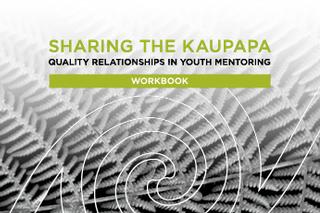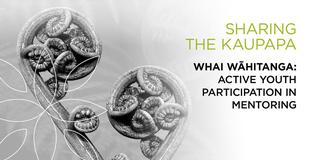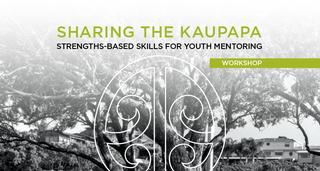Training | Events
Sharing the Kaupapa
Sharing the Kaupapa workshops - overview
Since its inception NZYMN has had a focus on strengthening intentional youth mentoring in Aotearoa.
Part of this work has concentrated on building mentor capability and sharing resources. To achieve this aim we offer a Guide to Effective and Safe Practice in Youth Mentoring and have developed training workshops to support this document. There have been three Sharing the Kaupapa series so far.
Series 1: Introduction to the Guide to Effective and Safe Practice in Youth Mentoring
Series 2: Building Quality Relationships in Youth Mentoring.
Series 3: Whai Wāhitanga: active youth participation in mentoring.
These workshops have proved popular across the motu and encouraged us to produce more. We now offer a fourth series.
Series 4: Strength-Based Skills for Youth Mentoring
They are designed to build mentoring capabilities and are specifically for people who work with young people, including: mentors, mentor programme providers, youth workers, educators, school counsellors, pastors, central and local government agency staff and community workers. The three workshops are:
Further details on each of these workshops is provided in the following paragraphs.
Quality Relationships in Youth Mentoring

This workshop is focused on the art of forming and maintaining relationships with young people in mentoring.
Workshop objectives
- To learn more about effective mentoring
- To develop specialised skills to build relationships with young people
- To reintroduce and remind practitioners about the Guide to Effective and Safe Practice in Youth Mentoring (2nd edition)
- To expand upon Section 3 of the Guide: The Mentoring Relationship
- To provide new frameworks, research and skills to strengthen quality mentoring relationships, available for all levels of mentoring programme delivery, including coordinators, teachers, mentors, youth workers and volunteers.
- To strengthen regional and national networks in the well-established youth mentoring community
- To have fun!
Workshop content and structure
The workshop is structured to mirror the typical mentoring relationship journey.
- Youth mentoring recognises culture
- Youth mentoring requires contemplation
- Youth mentoring prioritises connections
- Youth mentoring creates covenants
- Youth mentoring includes challenges
- Youth mentoring needs continuity
- Youth mentoring enables change
Whai Wāhitanga: Active Youth Participation in Mentoring

This workshop is all about encouraging active youth participation in mentoring.
Workshop Objectives
- Learn more about effective mentoring, with a particular focus on the unique perspective of young people.
- Practise what we preach and involve young people in training others about youth mentoring.
- Support young people to share their experiences in mentoring.
- Consider what helps and hinders young people engaging in mentoring.
- Understand and enable the conditions of real youth participation (what needs to be in place).
- Become familiar with relevant models and frameworks, starting with mātauranga Māori and locating ourselves in a global context.
- Reflect on your own, and your organisation’s capacity to involve young people in decisions that affect them.
- Develop specialised skills, in mentors and mentoring organisations, that encourage and support youth participation in decision making.
- Strengthen regional and national networks in the well-established youth mentoring community.
Workshop content and structure
- Understanding Whai Wāhitanga in mentoring.
- Thinking through models of participation including indigenous approaches and Wierenga’s Star.
- Hearing the voice of young people in mentoring.
- Exploring 7 pointers for practice: a process for supporting participation.
- Using a new reflective tool.
Strengths-Based Skills for Youth Mentoring
 We are excited to announce a brand new workshop in our Sharing the Kaupapa series. This new workshop is all about exploring strengths-based approaches in Youth Mentoring. We will be running nine of these around the motu in 2024 and registrations are now open for our first two being held in South Auckland and Wellington respectively.
We are excited to announce a brand new workshop in our Sharing the Kaupapa series. This new workshop is all about exploring strengths-based approaches in Youth Mentoring. We will be running nine of these around the motu in 2024 and registrations are now open for our first two being held in South Auckland and Wellington respectively.
Workshop objectives
In this new workshop our aim is to:
- increase depth in understanding the strengths-based philosophy
- identify the relevance of a strengths focus in youth mentoring
- shift youth mentoring practice and the language we use with and about young people to become increasingly strengths-based and mana-affirming
- explore a reflective process to guide change (the Column Tool)
- practice 12 strengths-based skills
- build even stronger youth mentoring networks, and of-course
- have fun!
WORKSHOP STRUCTURE
- Strengthen networks: whakawhanaungatanga with a strengths focus
- Key ideas: introducing the Strengths Approach
- Key ideas: strengths-based youth mentoring
- Key ideas: exploring power-over and power-with
- Practical stuff: the Column Tool
- Practical stuff: 12 Strengths Skills
- Practical stuff: small group work
- Applying this to ourselves.

